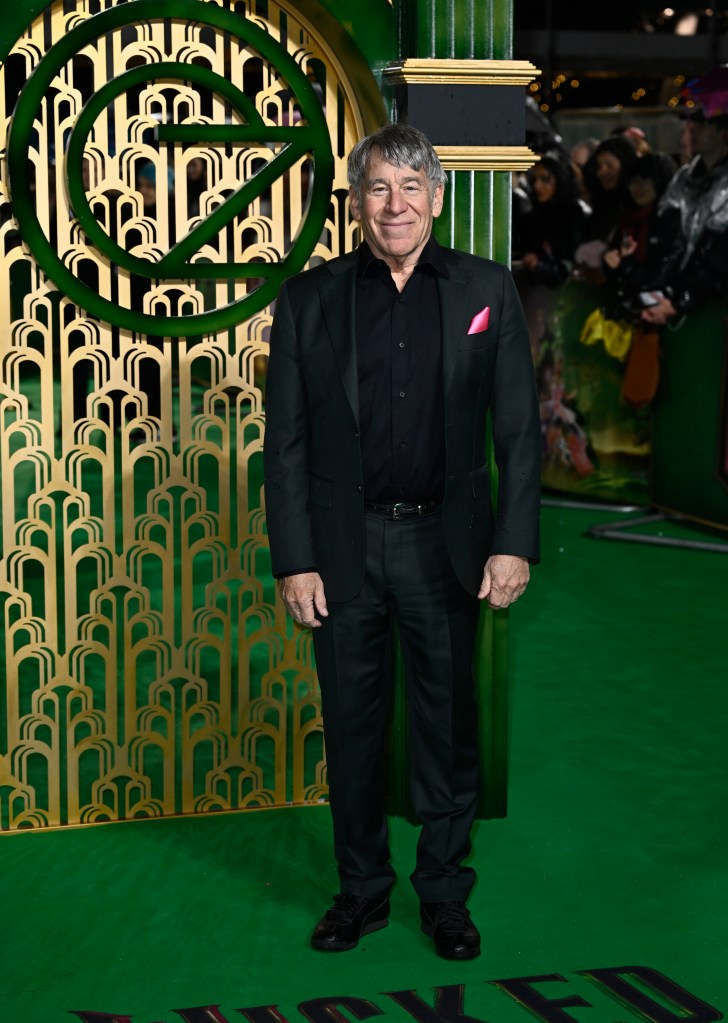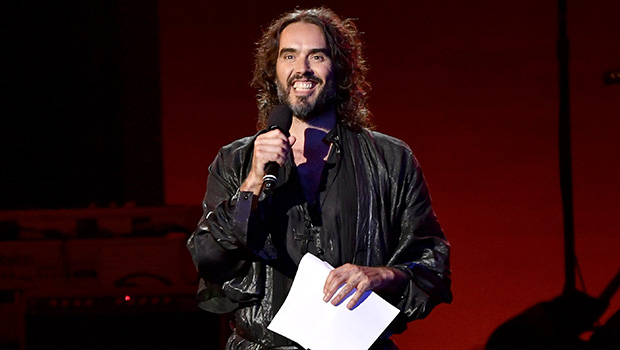
Stephen Schwartz will see you now. The worthier wizard of “Depraved” is the one who wrote considered one of Broadway’s all-time high tune scores and now, slightly over 20 years later, has overseen the transition of that music into a movie that’s nearly definitely on the quick observe for Greatest Image competition. He’s not the one veteran of the seminal Broadway crew on board for the music, both, because the soundtrack finds him rejoined by the stage manufacturing’s authentic arranger and music supervisor, Stephen Oremus.
It’s a world-class Staff of Stephens. Past having been the first instigator behind turning “Depraved” right into a stage musical (drawn from Gregory Maguire’s guide), Schwartz is famend for profitable six Tonys and three Oscars because the composer and/or lyricist of the reveals “Pippin” and “Godspell” and movies like “Enchanted.” Oremus, in the meantime, is a Tony winner for his orchestrations on “The Ebook of Mormon” and “Kinky Boots,” and has additionally taken the lead on fleshing out the scores for Broadway reveals like “Frozen” and “Avenue Q” and the movie “Frozen 2.” (They collaborated carefully with a non-Stephen, music producer Greg Wells; search for a separate interview with him coming on this house.)
Schwartz is at the moment Oscar-shortlisted for collaborating with John Powell on the instrumental rating for “Depraved.” However he’s already gone down in historical past for song-based achievements, which contain instructing the world precisely what a “battle cry” appears like when divas are enlisted. Selection talked with him and Oremus about previous and current inventive choices that went into the music, shortly after the movie handed a $600 million international field workplace mark, making it the best grossing Broadway musical movie adaptation in historical past.
Individuals who have been “Depraved” followers at factors over the past 20 years have been rediscovering totally different songs that they’d form of forgotten amid the extra well-known numbers. Is there any tune within the rating you’re joyful to see individuals rediscover?
Schwartz: No, I don’t assume there’s one. However I’m having fun with seeing various things that come that I’ve seen very lately. One was librarians on the Library of Congress who by some means had memorized the choreography for “What Is This Feeling?” and had been performing it within the aisles, which was wild. They had been superb at it, too, and the way they managed to study that choreography, I don’t know. After which simply at this time, it was a very humorous video that somebody despatched me of a younger woman in her storage, painted inexperienced and doing a a lip-sync model of “Defying Gravity” by standing in a wagon together with her father form of rotating the wagon round. After which on the very finish, as she did the battle cry, the daddy lowered the storage door, like a present curtain. So I’m having fun with seeing these inventive private methods individuals are having fun with for themselves among the songs. I don’t have a selected favourite. Stephen, do you may have a favourite?
Oremus: Properly, as you was saying, the truth that “What Is This Feeling” has turn into this dance craze go throughout the web has been form of nuts. And the opposite one that really I believe has been a very the massive shock is the love and appreciation for “I’m Not That Lady,” which is that this quiet gem of an emotional second in Act 1 of our present. And after the movie, so many individuals have stated, “Oh my gosh, the best way she sings that tune, and the best way that that comes out of the scene, it’s so stunning and touching.” I’ve actually been pleasantly stunned by that.
Schwartz: Yeah, that’s one of many ones that Stephen Oremus and I made adjustments in for the film from the present — how we get into the tune, and in addition, the tempo of it’s a lot slower. We slowed it down as soon as we heard how Cynthia (Erivo) sang it and simply wished to offer her voice the room to breathe in it, together with the kind of instrumental interlude. There are variations about it that I’m glad individuals are appreciating.
Oremus: Apparently sufficient, that’s the solely tune within the rating that we modified the important thing for. And we truly raised the important thing for Cynthia, as a result of it sat in a a lot, way more wealthy register for her.
That’s attention-grabbing. There’s a historical past of tailoring issues for the actresses that goes again to the unique Broadway manufacturing. I learn that the vocal strategy for the character of Glinda ended up altering as a result of Kristin Chenoweth had at all times wished a possibility to sing in her pure soprano vary, and so that you got here up with this concept that she would sing in that vary when Glinda was addressing the general public, however use one thing totally different for her on a regular basis voice within the present.
Schwartz: I believe that’s one of many actually cool issues about musical theater, and I believe it’s true extra in musical theater than straight performs, is how collaborative the creation course of is, and the way your lead actors sing can actually have an effect on the ultimate model of the tune. I imply, not being a playwright who does so-called straight performs, I don’t understand how a lot actors affect the ultimate model of a play, however they’ve lots of affect in musicals, since you wish to make it bespoke. You wish to make each be aware and each rhythm and tempo work for them as they interpret the character so all of it feels pure and easy. However then that turns into the template (for future productions).

Stephen Schwartz attends the “Depraved: Half One” European Premiere at The Royal Pageant Corridor on November 18, 2024 in London, England.
Gareth Cattermole/Getty Photos
Oremus: Cynthia and Ari (Ariana Grande) have each spoken about this within the press tour. However after we had been in rehearsals, they’d (tentatively strive new issues), and Stephen and I might go “Yeah… and? How about some extra?” And so they’re like, “Oh, we are able to do different issues?” They had been had been treating the fabric with such respect, and had been so excited to truly wrap their voices round and actually inhabit these characters and discover for themselves the place it wanted to be. And, for us, with the music total, I believe that that was additionally a really large factor to think about. However, you realize, we had this piece of historical past, for 20 years. Everybody is aware of the solid recording of “Depraved,” so it actually was like, how will we honor what we made the primary time and blow it up into this model new, stunning new imaginative and prescient of the world that we’re submerging individuals into? That was the enjoyable problem for us. Each time any of the individuals on the music crew — whether or not it was one of many orchestrators or the actors — wished to do one thing totally different, Stephen and I might push them in that route and say: Let’s preserve exploring. Let’s have some enjoyable with it.
Is there something moreover “I’m Not That Lady” that you can imagine the place there was an adjustment made due to who the solid members had been and what their voices had been?
Schwartz: There definitely had been different changes made, however I don’t assume they had been essentially for that motive. I’m occupied with “Dancing Via Life,” which modified due to the character of the choreography that Chris Scott wished to do, and in addition our means to get a distinct form of rhythm observe after we simply had extra choices and extra devices to select from. Though John Bailey additionally did new issues vocally that we appreciated and saved within the film and within the soundtrack, however that actually wasn’t modified particularly due to him. That was simply extra what was out there to us.
Oremus: Properly, I might additionally remind you of the top of “Fashionable”…
Schwartz: Oh, the (prolonged) finish of “Fashionable,” which Ariana was form of immune to —as a result of she thought it’d really feel as if we had been doing it for Ariana Grande, versus for the character of Glinda. And it was solely after I stated to her, “Look, if I’d considered this initially, I might’ve achieved this within the present. I simply didn’t consider it till now. However truly it feels extra like Glinda to me than what we did initially.” Then she embraced it. However Ariana and Cynthia significantly had been very involved about ensuring that each selection was concerning the character and the storytelling, and never about them as performers outdoors of the story.
What particularly was that change in “Fashionable” that Ariana was apprehensive about?
Schwartz: Properly, there’s a form of coda, an enlargement of what you could possibly name the “la-las” on the finish, that doesn’t exist within the present, however simply felt proper to us presently.
Oremus: It nearly didn’t make it. Keep in mind, Jon and Chris even had been like, “Properly, let’s stick to the unique ending.” And all of us saved pushing …
Schwartz: The music crew had been like, “No, no, we’ve got to do that.”
Oremus: After which everybody simply began taking part in within the sandbox and discovered a very thrilling technique to do it.
Schwartz: Yeah. I believe Stephen Oremus actually characterised the method properly, earlier when he stated that folks got here to this with lots of respect each for the fabric itself and for the followers, to be sincere — different individuals over time who knew the “Depraved” soundtrack, knew the present. We didn’t wish to disappoint them or make them really feel that we had performed quick and unfastened with what it was that they beloved about it. However on the identical time, it was 20 years later and we had totally different personnel and positively much more instruments at our disposal musically, and we wished to see what would occur if we made full use of them.
Wasn’t it was a 23-piece orchestra that you simply had on Broadway?
Schwartz: That’s appropriate, yeah.
Nobody on the time seeing the present or listening to the unique solid album stated, “Oh, this doesn’t sound full.” However now, to have decisions of orchestration which are limitless — no allusion supposed — did you’re feeling like, “OK, now we get to do what we lastly at all times wished to do in our desires, this very full model”? Or is it extra like, “No, we did it precisely with the scope we wished to on Broadway…”
Schwartz: I believe that (the latter) is extra correct. After we had been doing the present, we had been frankly lucky to have as many musicians as we did. That needed to do with negotiations with the 802…
Oremus: We received grandfathered in. They really had minimize the musicians and we received 5 extra.
Schwartz: As a part of the deal, we had been capable of have a bigger orchestra than Broadway reveals are inclined to have now. However we had been very pleased with our orchestra and/or orchestration initially. And naturally after we made that solid album, we did improve the string part slightly bit, as one does. That’s a fairly widespread follow while you do the recording of a Broadway solid album. However, yeah, I don’t assume there was ever some extent the place we had been feeling, “Oh, if, if solely we had 87 items, we might do that otherwise.” Nevertheless it was thrilling what we had been capable of do sonically and musically, after we had that for the film.
Oremus: Yeah. I believe we’ve got to additionally not lose sight of the actual fact — and this was the pleasant half for Stephen and myself — that we had been constructing it for the display screen. We had been constructing it to the edits. (Previous to manufacturing) we had recorded every part to those form of MIDI demos that Greg Wells and I put collectively to be able to make it really feel expansive and large, so it didn’t really feel like they had been simply singing to a piano observe for almost all of the movie, however felt like they’d assist. After which in post-production, then we received to actually go, OK, now we’re gonna make every part actual, primarily based on what they shot.

Stephen Oremus attends the press junket for “Hire” at Fox Studio Lot on January 8, 2019 in Century Metropolis, California.
Getty Photos
Schwartz: Yeah, Stephen is true in reminding me, and imparting to you, that the orchestration was very influenced by what we noticed. In reality, we made an early mistake — or I made an early mistake, and discovered from it, as a result of I don’t have lots of expertise, frankly, in taking what was a stage musical and making it right into a film musical. So after we first had been engaged on “The Wizard and I,” which was one of many first songs that we orchestrated, with out seeing what was on the display screen. Stephen and I had been working with Jeff Atmajian, our orchestrator, and we got here up with one thing that we appreciated and went backwards and forwards loads and actually thought we had it. Then we checked out it in opposition to image and immediately thought, “Oh no, we don’t have it in any respect.” And we needed to make a rule for ourselves to at all times have a look at the image first, and that every part would at all times be primarily based on what goes be on the display screen, and ensuring that we’re supporting that visible with what individuals are listening to.
Is there a technique to describe what felt totally different while you labored extra to enhance what was on display screen?
Schwartz: Generally one thing that made sense as a recording didn’t actually totally assist what was on the display screen. And naturally after we redid it, it nonetheless is smart as a recording, nevertheless it’s totally different as a result of it additionally really accompanies what you’re seeing. Or a minimum of that was our purpose, really to accompany precisely what was on the display screen by way of the place the builds had been, the place the circulation was, the place the breaths had been, the place the movement was and wasn’t… all of that that wanted to be supported orchestrationally.
You talked about having 87 items within the orchestra. Is that the precise quantity?
Oremus: I must rely. It was about 85, I believe, with the percussion and the saxophones that we added. Plus Greg Wells, for those who rely him as…
Schwartz: That’s true. When you rely him, it might be over 100.
Oremus: Greg performed the complete rhythm part. I imply, a number of of us performed keyboards — Dominick Amendum, me, Greg, we performed keys too — however primarily Greg performed all of the guitars, bass guitar and drums on the entire movie.
Schwartz: So there could also be a number of guitar tracks (on a tune)… Greg is kind of a one-man band. To start with, he’s an excellent pianist, which is how I first met him when he was 19. However now he’s additionally a very high quality guitarist, bass participant and drummer, and so he was capable of construct the rhythm tracks on his personal. … And clearly among the songs are extra pop-oriented than others, so it was a course of. In some songs, Jeff took the lead (with orchestration), after which we might say to Greg, “Properly, we’re actually lacking a guitar really feel right here. May you go and play it in?” After which in lots of circumstances, as Stephen is describing, it began with a rhythm observe, after which we did what we used to name sweetening, again within the ‘70s after I began as a file producer.
Talking of Greg Wells, I used to be speaking with him and he relayed one thing you stated, Stephen (Schwartz). He stated that when the soundtrack was being recorded, and a few of these actually ominous, premonitory chords had been arising throughout “No One Mourns the Depraved,” somebody within the studio commented on how scary the chords sounded. And he quoted you as responding, “Properly, it is a horror film.”
Schwartz: Yeah, there are undoubtedly horror-movie elements. I imply, that’s one of many issues that I like a lot about Jon Chu as a director, that the place you wanted it to be a scary horror film with a jolt, he might do this. The place you wanted it to be an motion film, he might do this. The place you wanted it to be a rom-com, he might do this. The place you wanted it to be a young, private psychological story, he might do this. His vary is so huge and he can do all these types, and all these genres, if you’ll, inside one film, with out it seeming that it’s lurching round stylistically, as a result of all of it feels of a chunk. However when he does an motion sequence, it’s really an motion sequence, and so forth. If you concentrate on the tried balloon escape that occurs in direction of the top, which is within the film and never within the present, that’s undoubtedly an motion sequence. And the flying monkeys are like horror film characters. So I like that these totally different cinematic genres are a part of the film they usually all slot in into one cinematic world. That’s a tribute to Jon Chu, I believe.
A few of us who beloved the present 21 years in the past would possibly admit to having spend a few of that subsequent time dreading the film, for concern of individuals taking it on who would possibly ignore any of these components, particularly dropping the darker stuff. However the hardcore “Depraved” heads appear to agree any dread was misplaced.
Schwartz: Properly, it is a bizarre factor for an writer to say, however I do actually wish to give slightly little bit of a tribute to the studio itself and the studio executives, as a result of to start with, they didn’t fireplace the unique authors and herald an entire new crew, which is what normally occurs. After which, secondly, they listened to us. And a part of that’s as a result of Marc Platt, who’s clearly an outdated hand within the film enterprise and a really skilled and far famend producer, was our producer on the film in addition to our lead producer on the present. In order that helped. But additionally, having labored for different film corporations, which can stay anonymous, who’re much more intrusive and have loads much less regard for what the creators truly assume the film must be, I’ll eternally be grateful to the Common executives.

(L-R) Ariana Grande, Jonathan Bailey, Marc Platt, and Stephen Schwartz converse onstage at Common Footage presents a particular screening of “Depraved” at DGA Theater on November 14, 2024 in New York Metropolis.
Getty Photos for Common Pictu
I bear in mind writing a chunk on what it regarded like for a “Depraved” film occurring, going to Marc Platt’s workplace to speak to him… and that was 15 years in the past. Did it require endurance in your half to attend slightly over 20 years for this to come back to fruition after the present opened?
Schwartz: , we weren’t ready. Stephen (Oremus) will inform you this too, we had been continuously speaking about, after we do the film, what if we do that? — continuously investigating issues we might do, a few of which had been undoubtedly cul-de-sacs and incorrect turns and lifeless ends. It wasn’t as if the thought of doing a film was simply sitting on a shelf and we paid no consideration to it after which immediately the beginning gun went off and we began sprinting towards making the film. Stephen Oremus and I had been speaking loads over these 20 years about how we wished to deal with the music for the film. Winnie Holzman and I might continuously discuss, “Oh, within the film… what about this scene that’s not within the present? And the way would we do that specific sequence?” We had been roughly continuously occupied with and dealing on the film, in order that after we lastly received the prospect to make it — and I believe it occurred on the proper time — there was lots of again story and again work, preparatory work, that every one of us had achieved.
Does it really feel odd while you look again on a Broadway present like “Depraved” and consider all of the adjustments and additions that had been being made on the final minute — and even between the San Francisco tryout and the Broadway opening — after which immediately issues are locked in and every part that was achieved nearly on the spur of the second is locked in as one thing that feels basic… for those who’re fortunate, as you had been right here?
Schwartz: That’s the nature of musical theater, and lots of it’s as a result of it’s so collaborative, and a few of it’s as a result of the viewers is considered one of your collaborators, so that you don’t actually know what your present is till you may have it in entrance of an viewers, and you then make lots of discoveries. A few of these discoveries could be made by this strategy of doing readings and workshops and alluring individuals, nevertheless it’s not really till you simply have individuals stroll in off the road and sit down within the seats and the present begins that you simply additionally make lots of discoveries. And so lots of revisions and enhancements occur at that time. So it’s fairly last-minute, nevertheless it doesn’t fairly really feel… properly, I used to be gonna say, it doesn’t really feel like a kind of hysterical last-minute rush, however after all it does. However you realize that’s a part of the method, so it doesn’t come as a shock.
And now, 21 years later, an opportunity for extra tweaks, albeit not many main ones.
Oremus: In adapting the musical to the display screen, everybody that I encountered as we had been filming would ask me, “Properly, are they including stuff from the guide? Are they altering this, or this?” … And I might say, all I can inform you is it’s the most loving adaptation of what we made within the first place. It truly is a tribute to John Chu and the authors that something that was added to this movie from what what the unique model was actually was added within the service of story and character improvement and simply enriching the world. What I like is, as theater makers, we’re so used to telling the story as quick as you may. And I believe the very thrilling factor that everybody has embraced about this movie is, “Oh, they let it breathe.” Which means additionally they continued to develop the characters and story and preserve everybody engaged in all the correct spots. That, I believe, is the feat of this adaptation, that we had been capable of form of tow that line and obtain that stability.
Schwartz: Yeah. I imply, Marc Platt very, very early on made the dictum that any change needed to be additive. It couldn’t be a change only for its personal sake. And it couldn’t be for any motive aside from what you’ve simply articulated, Stephen. However we saved coming again to that phrase. As we might focus on decisions we had been making: Is that this actually additive?
Oremus: It was actually enjoyable having Kristin and Idina (Menzel, the unique Broadway leads) come again to affix us.
Schwartz: However we at all times wished to do this.
Oremus: And by the best way, it was additive as a result of we discovered extra about how (the Wizard hookwinked the populace).
Schwartz: We had been going to do this expanded “Wizomania” anyway. It was simply Jon Chu’s sensible concept to construct it round Kristin and Idina.
Talking of what’s additive, after all individuals are trying ahead to that you simply wrote full further songs for the Half 2 that’s coming subsequent yr. We all know you’re not going to offer spoilers on these. However I do know in studying concerning the authentic present that there have been stuff you wished to do in Act 2, that you simply couldn’t, like with Elphaba visiting the Badlands, as a result of it was slowing down the ultimate acceleration of the present. And I’m questioning whether or not, in including materials for Half 2, you went again to among the stuff you wished you could possibly have saved within the stage present that you simply dropped for pacing, or whether or not you ended up simply considering in completely totally different instructions.
Schwartz: We didn’t. Every part that was written is new. There’s nothing that was minimize that we stated, “Oh, let’s put this again in.” We had been capable of do some story enlargement as a result of, because the story is split into two components, we’ve got extra time, and so we had been capable of discover some issues that we needed to gloss over or in truth not do in any respect within the authentic present. However we didn’t return. We definitely didn’t return musically. With none spoilers, there may be one scene that we at all times wished to do, and briefly had written, however by no means made it into the present, and a model of that did make it into… properly, so far as I do know presently, within the edit, a model of that has at the moment made it again into film two.
Oremus: It’s nonetheless early.
Schwartz: It’s very early. … We sit up for it. However yeah, as I stated, there’s no, like, “Oh, this tune received minimize, however now we’re gonna strive it within the film” — there’s none of that.
The entire historical past of the reception to “Depraved” on stage after which on display screen includes some vindication. Not that that’s what motivates you or what you look out for. Nevertheless it’s at all times been kind of staggering that the present is as clearly nice as it’s however was not essentially embraced as a basic within the critiques from day one, and that a few of them in 2004 had been nearly hilariously dismissive.
Schwartz: I believe among the critics didn’t get what we had been doing. What they noticed was one thing that regarded large and form of lavish and visually gorgeous, they usually didn’t perceive that there may be content material together with that. I believe the audiences received it immediately. The audiences instantly received the political connotations, the social elements of the story. However lots of the critics, and it frankly was the New York critics… initially among the London critics too…. I believe once they see large and spectacular, they instantly dismiss the potential for content material. And on this case, that’s what occurred. When you do a present with two chairs, then if it’s an excellent present, and even generally if it’s not an excellent present, that will get embraced, it’s, “Oh, properly, this should be a critical present if it’s solely received two chairs for the set.” However for those who do one thing that’s as visually luxurious as (Broadway director) Joe Mantello and his crew did for our present, then I believe it received seen with vital suspicion in sure circles. Luckily, the audiences received it instantly, and so it actually didn’t matter what the critics needed to say.
Studying the discourse now, it looks like common individuals are getting the broader undertones and the topical elements of it much more than may be anticipated… the darker elements of the story that didn’t get sacrificed within the service of a light-weight leisure. It’s a film about fascism in addition to feminine friendship and empowerment. It’s simply an leisure to many, however individuals by and huge are expressing emotions about what makes this story really feel actually resonant to them at this time.
Schwartz: We’ve been saying we want it had been much less related. To be sincere, we’d stay in a greater world if this film had been much less related, let’s simply say that.
Individuals are additionally considering that “Defying Gravity” makes for an awesome ending to a film, versus a lead-in to a rest room break. How did you’re feeling about this changing into a climax, relatively a first-act nearer, in splitting the story in two? Understanding what you may have in that tune, we’ve got to think about you’re joyful it was as much as the duty of sending individuals out utterly un-frustrated.
Schwartz: It was definitely our purpose, very acutely aware and labored on significantly by the crew, to have every film, and I’ll say this prematurely — as a result of we’re simply plunging into film two now — to have two movies that would stand on their very own and be totally satisfying tales in their very own proper. To be sincere, one of many issues that received us speaking about doing two motion pictures within the first place was we couldn’t work out methods to get previous “Defying Gravity.” That it doesn’t matter what we adopted that with aside from a break, that you could possibly simply really feel that the viewers wanted a break. You might hear the sound of toes working up the aisles for popcorn. It’s such an finish of an occasion that it’s exhausting then to simply assume, “Oh, that was thrilling, and now what’s the following scene?” So I believe that was at all times simply constructed into the storytelling.
Then after all, Jon Chu did this utterly sensible cinematic realization of it and got here up with some concepts that we had not considered, together with the confrontation with the… I don’t wish to spoil it, however there’s some issues in there that Jon considered that we didn’t know we had been gonna have at that finish of the movie. However “Defying Gravity” is simply a type of moments for varied causes that it’s exhausting to simply preserve going with out taking a breath.
Something to say about Cynthia’s efficiency of that?
Schwartz: Simply that it’s hair-raising and astonishing. Ferocious is the phrase I used within the studio.
And singing stay… did you think about they’d go to among the additional lengths they did?
Schwartz: As a result of they’ve the flexibility to sing stay, it was at all times the intention, that as a lot of it as might be sung stay could be. However, every part was prerecorded and labored out prematurely, after which they may change some issues, clearly, on the spur of the second, if they’d that feeling. Nevertheless it had been very fastidiously rehearsed.
Oremus: It actually was thrilling as a result of, I imply, the 2 of them, they’re like athletes. I imply, they are surely. , I ought to say Cynthia truly ran like a half-marathon in the midst of the shoot. It was loopy. Nevertheless it actually was superb to construct that up from these rehearsals all the best way into the shoot. And to have two world-class singers like that, to have the ability to do this stay, it was simply actually, actually thrilling.
Schwartz: I don’t assume we anticipated Cynthia to be singing stay whereas she was the wrong way up, or Ariana to be singing stay whereas she was doing the excessive kicks. They exceeded our expectations by way of their talents.
It’s a must to be happy that the rating received shortlisted for the Oscars by the music department.
Schwartz: I’m joyful, and I actually wish to give a shout-out and nice credit score to John Powell, who was my collaborator on the scoring a part of it. I really feel what he did in his use of thematic materials and making the rating seamless with the songs is actually exceptional. And I wasn’t positive it might get observed. So I’m glad even to have gotten this far. Very, very excessive marks to John Powell, for, along with his expertise and musicality, his generosity in making an attempt to be sure that the elements of the rating that he did had been half of an entire and never, you realize, a neon signal flashing his identify.
Oremus: The opposite astonishing factor relating to John Powell’s work is that in hia writing, amongst all of this sensible rating that Stephen Schwartz has written of those songs, he’s becoming in and elevating these moments, and having to get again into songs. And generally it’s inside a tune the place he’s connecting totally different moments. He did it so superbly and so seamlessly.
Schwartz: I imply, that’s the phrase; the purpose of one thing being seamless is you don’t discover it. So I’m glad that some individuals are noticing the ability with which John did that.
A part of what many individuals love concerning the “Depraved” tune rating, and it continues within the work you’re describing that Powell did on the instrumental rating, is how a lot might occur inside a tune by way of totally different leitmotifs or reprises or self-interpolations, on high of dialogue generally coming into into it. There’s only a lot happening, ranging from the primary quantity, “No One Mourns the Depraved,” which is virtually 4 or 5 songs in a single. So trying again at a few of these San Francisco critiques within the early 2000s, the place some critics would make accusations just like the songs being “unmemorable”… not everybody has the flexibility to course of every part that’s happening, on first pay attention.
Schwartz: Sure, I imply, what individuals imply once they say one thing is “memorable” is that it received repeated time and again. That was our secret with “Day by Day.” That’s why “Day by Day” was memorable in “Godspell,” as a result of it was the identical factor time and again and time and again! So no marvel individuals remembered it. So I at all times really feel like “unmemorable” is simply one of many stupidest issues that critics say about one thing. Hearken to it a number of instances, after which for those who don’t bear in mind it, truthful sufficient. However for one thing on first listening to to have to be memorable, I really feel it’s a silly criterion.
Actually, among the best songs within the present isn’t even a separate tune unto itself. It’s “Limitless,” which simply comes again as a sub-theme, or interpolation, as individuals would say at this time, repeatedly.
Schwartz: Properly, you used the time period motif, and I believe that’s correct. And you realize, John Powell and I, and Steven Oremus, significantly, spent lots of time earlier than scoring occurred —, earlier than John was writing and I used to be writing to the extent that I did write the rating — speaking concerning the motifs: What did they imply by way of the characters, by way of the story? Actually form of figuring out how they might be used to reinforce storytelling, which is one other factor that I really feel John did extraordinarily skillfully.
The final word memorability of the songs might be additional confirmed on the sing-along screenings occurring nationwide.
Schwartz: I might need to sneak into a type of simply to see what that’s like.
But when these songs have so many choruses-within-choruses, and put singers as world-class as Ariana and Cynthia to the check, it does increase the query of what number of of them are actually all that easy to sing alongside to…
Schwartz: Properly, we’re not saying that individuals are gonna sing alongside properly.
Oremus: Nor have they got to. You sing alongside since you like it.
The post Stephen Schwartz, Stephen Oremus on How the Music of ‘Depraved’ Developed appeared first on Allcelbrities.








